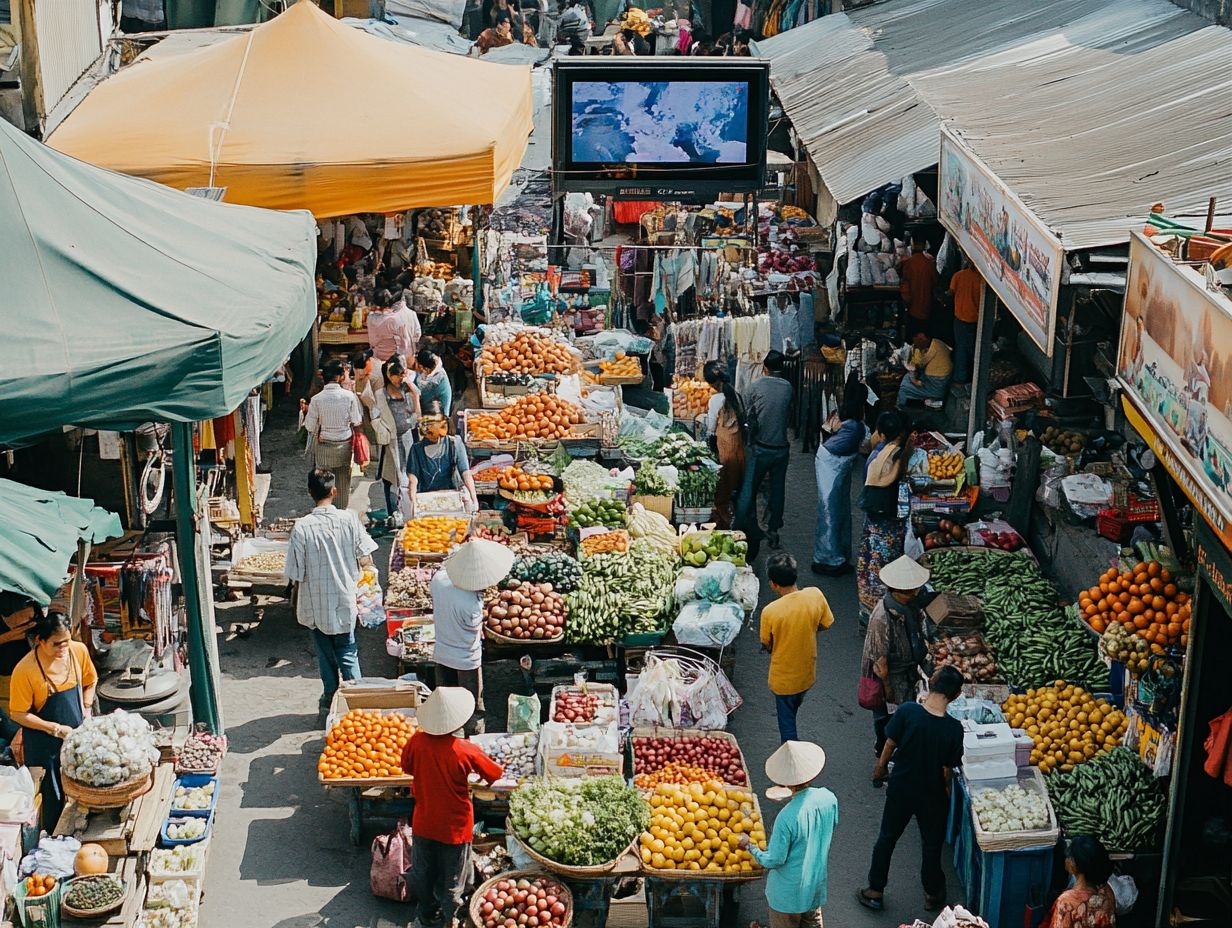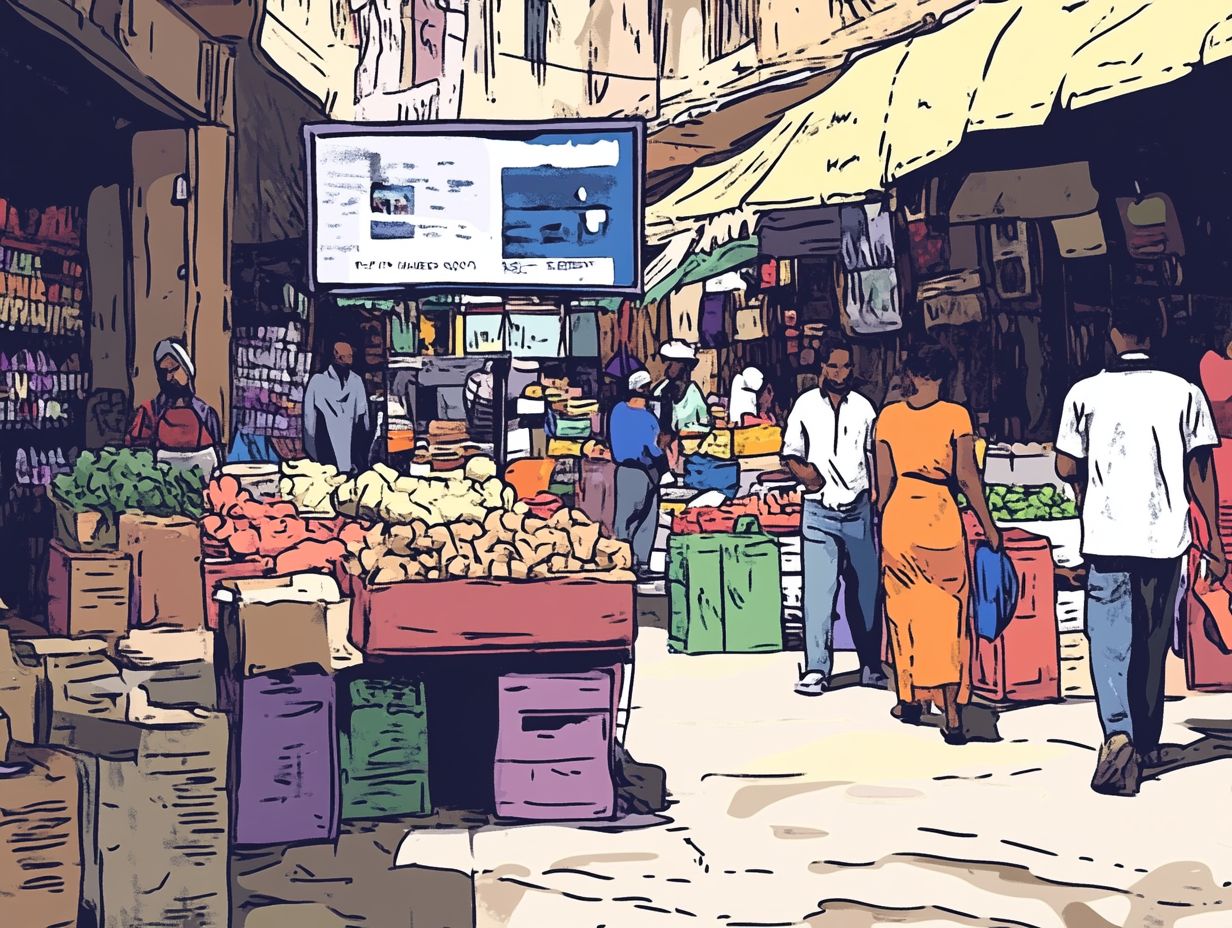The Effect of Global Events on Local Markets
In today s interconnected world, global events exert a profound influence on local markets. These events shape economic landscapes in ways that may surprise you.
Natural disasters, political unrest, and economic crises can disrupt supply chains, alter consumer behavior, and impact your investment strategies.
This article delves into how these global happenings affect local markets, offering real-world examples and strategies to navigate the challenges they present.
By grasping these dynamics, you can better position yourself to mitigate risks and seize opportunities for growth.
Contents
- Key Takeaways:
- Understanding the Impact of Global Events on Local Markets
- Examples of Global Events and Their Effects on Local Markets
- Strategies for Navigating Global Events in Local Markets
- Mitigating Risks and Maximizing Opportunities
- Frequently Asked Questions
- What are global events and how do they affect local markets?
- How do global events affect the stock market?
- Do all global events have a negative impact on local markets?
- How can investors prepare for the effects of global events on local markets?
- Are there any specific industries or sectors that are more vulnerable to the effects of global events?
- What steps can governments take to mitigate the impact of global events on local markets?
Key Takeaways:

Diverse investments can mitigate the impact of global events on local markets.
Strategic monitoring and response to market changes is crucial during global events.
Effective risk management and identifying potential opportunities can help optimize outcomes during global events.
Understanding the Impact of Global Events on Local Markets
Global events, such as trade shows, cultural festivals, and significant international conferences, like Expo 2020, are instrumental in shaping local markets.
They influence a wide range of factors, including job opportunities and community development.
In cities like Minneapolis, these events can provide a substantial boost to the local economy. This increase leads to higher visitor spending and stimulates growth in the hospitality sector.
For event organizers, community stakeholders, and local businesses, understanding the impact of these global happenings on local economies is essential. Grasping this connection can unlock opportunities and drive meaningful progress within the community.
What are Global Events?
Global events encompass a broad spectrum of significant occurrences, such as trade shows, cultural festivals, and major international conferences, such as Expo 2020. They draw attendees from across the globe.
These gatherings serve as invaluable platforms for networking, innovation, and cultural exchange, inviting participants from diverse backgrounds to engage and collaborate.
Each event typically boasts a range of activities, including:
- Workshops
- Keynote speeches
- Interactive exhibits designed to foster visitor engagement
The economic implications of these events are substantial. They invigorate local economies through tourism, hospitality, and retail activities.
Take, for instance, the Cannes Film Festival. It not only celebrates cinematic artistry but also brings significant benefits to the French economy.
Similarly, the Olympics drive infrastructure development and capture global attention. In essence, global events are vital intersections of culture, commerce, and collaboration, leaving lasting impacts on both attendees and the cities that host them.
Why do They Affect Local Markets?
Global events have a strong impact on local markets, largely due to the influx of visitors. This surge boosts revenue through visitor spending, invigorates the hospitality sector, and creates numerous job opportunities.
When major events, such as international sports competitions or cultural festivals, unfold, they do more than attract tourists; they energize local businesses by heightening demand for goods and services.
Consider the cities that hosted the FIFA World Cup; local restaurants enjoyed revenue surges of up to 30% during the event. This clearly illustrates the economic advantages of such exposure.
These events often spark community development initiatives, prompting local governments to invest in vital infrastructure improvements think transportation and venues that enhance the quality of life for residents.
The ripple effect of visitor spending reaches far beyond immediate gains. As travelers dine, shop, and explore attractions, local artisans and small businesses flourish, contributing to sustained economic growth.
Examples of Global Events and Their Effects on Local Markets
When you examine various examples of global events, you uncover their significant impacts on local markets. These events drive economic activity and provide community benefits, all while supporting local businesses.
Consider events like VeeCon, hosted by Gary Vaynerchuk, or vibrant cultural festivals. They often result in elevated brand awareness, increased bookings, and a remarkable boost in tourism.
Engage with upcoming global events to benefit your local markets!
Natural Disasters

Natural disasters can dramatically shift local economies, prompting significant changes in business activity and necessitating infrastructure upgrades for recovery.
These events disrupt commerce almost immediately, leading to business closures and job losses, ultimately impacting consumer spending.
Local resources may become strained, overwhelming essential services in the aftermath. In the long run, such disasters can reshape the business landscape, encouraging a shift toward more resilient practices and industries.
To mitigate future risks, local markets must craft robust response strategies, including disaster preparedness training and diversifying economic activities. Recovery efforts generally include providing financial aid to affected businesses, rebuilding infrastructure, and attracting new investments to revitalize devastated areas, fostering a stronger local economy.
Political Unrest
Political unrest creates unpredictable environments for local markets, influencing economic stability and compelling you to adopt robust risk management strategies to protect community interests.
This instability often results in supply chain fluctuations, shifts in consumer behavior, and widespread uncertainty among community stakeholders.
Local businesses, relying on consistent demand and operational continuity, face challenges in navigating this rapidly changing landscape. Therefore, you, along with entrepreneurs and local leaders, must implement adaptive strategies that tackle immediate threats and cultivate resilience within the community.
Engaging diverse stakeholders, including government agencies and non-profits, is essential in orchestrating a unified response to mitigate economic impacts, ensuring communities can recover and thrive amid adversity.
Economic Crises
Economic crises can wreak havoc on local economies, leading to job market declines and stalling community development while sparking discussions around globalization and market adaptation.
The ripple effects go beyond financial statistics; they infiltrate the fabric of daily life in your community. As job opportunities dry up, families face challenges in meeting their basic needs, eroding social cohesion and heightening reliance on support systems.
Local businesses struggle to keep their doors open, which accelerates the downward spiral of economic activity. In this interconnected world, globalization meaning businesses compete not just locally but also internationally adds complexity to the situation.
Therefore, grasping these dynamics is crucial for you to develop viable strategies that build resilience and encourage sustainable development.
To effectively navigate the complexities of global events, you must adopt strategic decision-making and diversify your investments. This approach will help you withstand market fluctuations and capitalize on emerging opportunities.
Diversification of Investments
Diversifying investments is essential for your local business if you want to shield yourself from uncertainties and amplify economic advantages.
By allocating your resources across various sectors, you can reduce risks and unlock new revenue streams, ensuring sustainability even in tough times.
Picture your favorite caf introducing a catering service or partnering with nearby farmers for fresh produce. This not only attracts health-conscious consumers but also supports the agricultural community.
Such strategies fortify your business and positively impact the local economy, driving job creation and enhancing community resilience. When you engage with local stakeholders be it suppliers or customers you cultivate a strong network that benefits everyone involved.
Start planning your diversification strategy today!
Monitoring and Responding to Market Changes

You need to monitor and respond to market changes constantly. This keeps you competitive and helps you engage your audience during global events.
It’s more than just tracking trends. You need to analyze consumer behavior to make decisions that resonate with your audience.
Utilizing tools like market research surveys, social media analytics, and customer feedback mechanisms is imperative in this ever-evolving landscape. By staying attuned to shifts in the marketplace, you can recalibrate your marketing strategies and ensure they align with the changing preferences and needs of your audience.
This strategic decision-making fosters consumer loyalty and enhances engagement, especially during unpredictable global events that can disrupt established market norms.
Mitigating Risks and Maximizing Opportunities
To attain sustainable economic growth, you must concentrate on mitigating risks while seizing the opportunities that arise from global events. Risk management strategies are plans to identify and minimize potential losses.
This can be accomplished through the implementation of effective risk management strategies.
Effective Risk Management Techniques
Implementing effective risk management techniques is essential for you to safeguard against potential economic impacts and ensure community stability.
By identifying vulnerabilities and proactively addressing them, you can create robust strategies that protect your assets and enhance the overall resilience of the community.
Techniques like diversifying suppliers, securing comprehensive insurance coverage, and investing in employee training programs reinforce your operational capability.
Creating contingency plans for unexpected events can empower your business to thrive amidst uncertainty!
These methods alleviate the financial burden during crises and foster a sense of security within the community, allowing everyone to thrive even when faced with challenges.
Identifying Potential Opportunities for Growth
Identifying potential opportunities for growth gives you the power to harness the economic benefits of global events through targeted tourism campaigns and strategic decision-making.
By closely monitoring trends and shifts in traveler behavior influenced by these events, you can tailor your offerings to meet the evolving needs of visitors.
This may involve launching unique promotional packages, forming partnerships with nearby attractions, or enhancing customer experiences to encourage longer stays.
Utilizing social media platforms to amplify your presence and engage with potential tourists is essential, drawing attention to your distinctive features. Proactive decision-making positions your business for success and strengthens the local economy, creating a win-win scenario for both you and the community.
Frequently Asked Questions
What are global events and how do they affect local markets?

So, what are global events? They are major occurrences like political changes, economic crises, natural disasters, and pandemics that can shake up local markets. These events can disrupt the supply and demand chain, alter consumer behavior, and affect the overall economy.
How do global events affect the stock market?
Global events can have a direct or indirect impact on the stock market. For example, a trade war between two countries can result in higher tariffs and trade restrictions, leading to a decrease in stock prices for companies that rely heavily on international trade. On the other hand, a natural disaster in a particular region can cause a decline in the stock prices of companies operating in that area.
Do all global events have a negative impact on local markets?
No, not all global events have a negative impact on local markets. Some events can create opportunities for certain industries or companies. For instance, a new trade deal between countries can result in increased trade and boost the economy, leading to a positive impact on the stock market.
How can investors prepare for the effects of global events on local markets?
It’s crucial to act now and diversify your investments to safeguard your future. Investors can prepare for the effects of global events on local markets by investing in a variety of industries and sectors. This strategy minimizes the impact of a potential market downturn.
It is also essential to stay updated on current global events and monitor their potential impact on the market.
Are there any specific industries or sectors that are more vulnerable to the effects of global events?
Yes, certain industries are more vulnerable to the effects of global events than others. For example, industries heavily reliant on international trade, such as agriculture and manufacturing, are more susceptible to changes in trade policies and tariffs.
Tourism and hospitality industries are likely to be affected by natural disasters or pandemics.
What steps can governments take to mitigate the impact of global events on local markets?
Governments have powerful tools to tackle these challenges. They can provide money support programs to assist affected industries and implement trade policies to protect local businesses.
Investing in disaster preparedness and relief efforts is also vital. They can also work with international organizations and other countries to address global issues and stabilize the economy.






